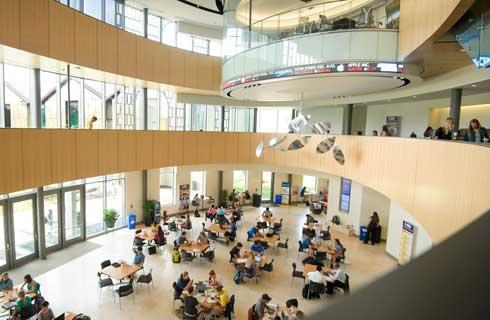汽车工程(荣誉)学士学位
BEng (Hons) Automotive Engineering

学历文凭
Bachelor Degree with Honours

专业院系
Aeronautical and Automotive Engineering

开学时间

课程时长

课程学费

国际学生入学条件
IDP—雅思考试联合主办方

雅思考试总分
- 雅思总分:
- 托福网考总分:
- 托福笔试总分:
- 其他语言考试:
CRICOS代码: H330
申请截止日期: 请与IDP联系 以获取详细信息。
课程简介
Automotive technologies have changed dramatically over the last five years, with electrification and connectivity being central to the future of the industry. Manufacturers are modernising engineering activities accordingly, with significant pressure to reduce development time and cost through digitisation of the engineering process. The Automotive Engineering programme at Loughborough will enable you to specialise in subjects that are directly relevant to a rapidly changing industry and the future of ground transportation.Our dedicated Department of Aeronautical and Automotive Engineering (one of only two in the UK) has been teaching Automotive Engineering and working with major UK industry for over fifty years. Our course is based on our heritage of working alongside industry, and from the outset we make use of automotive specific examples in teaching the engineering fundamentals, an approach that differs from many other automotive engineering courses in the UK. Our ongoing exchange of knowledge with industry ensures that our taught courses are immediately relevant to the problems faced by industry, today.From topics related to new powertrain architectures, to specialist modules including Battery Technology and Machine Intelligence, the course also includes more foundational topics such as Aerodynamics, Materials, Structures and Experimental and Computational Fluid Dynamics. These provide you with a comprehensive knowledge of the underlying and unchanging physics of automotive systems essential to modern automotive engineering. As an automotive engineer, you will make extensive use of your theoretical and analytical skills, but it is also important for you to be able to appreciate the more practical aspects of engineering. Practical activities are integral to our course, for example, by spending a week at HORIBA MIRA proving ground you will learn how to collect and analyse vehicle handling, off-road dynamics, noise measurement, braking performance and wet weather driving data. This and many other ‘hands-on’ activities will enable you to put the theory you have learned into practice.Teamwork and management skills are critical to you as you develop your career and move to more senior positions. During the course you will have many opportunities to develop these skills, including working as part of a team to design a vehicle of the future. In your final year you will manage your own original research project to solve a real-world engineering problem. As these courses are taught within the Department of Aeronautical and Automotive Engineering, our teaching staff are engaged in exciting research into air and ground transport which helps keep our course up-to-date. We bring together outstanding facilities, superb teaching, and strong links with industry to make sure you are completely ready for your future career.
相关申请
 预科
预科 奖学金
奖学金 实习机会
实习机会 在校学习
在校学习 跨境学习
跨境学习 校园授课-线上开始
校园授课-线上开始 在线/远程学习
在线/远程学习
开学时间&学费
学费信息仅供参考,请与IDP联系以获取详细信息
| 开学时间 | 时长 | 学费 | 地点 |
|---|
学校排名

世界排名401
数据源:
泰晤士高等教育世界大学排名
关于拉夫堡大学

拉夫堡大学自1909年以来,作为继续教育和高等教育机构,拥有悠久的成功历史。如今,它是英国乃至世界领先的教育机构之一。该大学每年为成千上万的学生提供一流的教育和学习体验,并始终位列英国前十(《完全大学指南》,2017-2026)。拉夫堡大学的体育学科享誉全球,并被评为全球体育相关学科最佳大学(《QS世界大学学科排名》,2017-2025)。该大学以其各学科卓越的教学质量而自豪,并招募了一支多元化、多国籍的学术团队,确保学生接受由专业且经验丰富的教职员工提供的多样化教育。大学为包括工程、设计、商业等在内的所有学科领域提供卓越的设施。学校包容性的校园热烈欢迎国际学生,并提供广泛的支持设施,帮助他们在整个学习期间安顿下来并茁壮成长。大学设施齐全,致力于为学生提供卓越的学术体验和有趣的学生生活方式。学校拥有多元化的学生会、轻松的学习和社交空间以及全面的学生支持服务。大学的主校区位于东米德兰兹郡的拉夫堡镇。该校区交通便利,可轻松前往周边大城市,并为学生提供愉快的学习体验所需的一切。第二个校区位于伦敦伊丽莎白女王奥林匹克公园。拉夫堡大学的伦敦校区专为研究生学习和研究而设立。拉夫堡大学伦敦分校汇聚了具有影响力的思想领袖、先锋研究人员和富有创造力的创新者,为学生提供英国最优质的研究生学习体验之一。
本校相关课程

会前课程C
学历文凭
English Language
开学日期
课程费用总额


博士学位体育,运动与健康科学
学历文凭
Ph.D.
开学日期
课程费用总额


PhD International Relations, Politics and History
学历文凭
Ph.D.
开学日期
课程费用总额


物理学博士
学历文凭
Ph.D.
开学日期
课程费用总额


机械,电气与制造工程博士学位
学历文凭
Ph.D.
开学日期
课程费用总额


博士数学科学
学历文凭
Ph.D.
开学日期
课程费用总额

其他相关课程

BEng (Hons) Automation and Digital Engineering (with Foundation Year)
提赛德大学
学历文凭
Bachelor Degree with Honours
开学日期
课程费用总额


汽车机械诊断四级证书
 希拉巴克斯特培训中心(私立)
希拉巴克斯特培训中心(私立)学历文凭
Certificate IV
开学日期
课程费用总额


Certificate III in Light Vehicle Mechanical Technology
Trinity Institute
学历文凭
Certificate III
开学日期
课程费用总额


汽车和自动驾驶汽车(荣誉)学士学位
 索尔福德大学
索尔福德大学泰晤士高等教育世界大学排名:981
学历文凭
Bachelor Degree with Honours
开学日期
课程费用总额


Certificate IV in Automotive Electrical Technology
 曼兹技术学院
曼兹技术学院学历文凭
Certificate IV
开学日期
课程费用总额


赛车工程-MEng
 牛津布鲁克斯大学
牛津布鲁克斯大学泰晤士高等教育世界大学排名:917
学历文凭
Bachelor Degree
开学日期
课程费用总额










